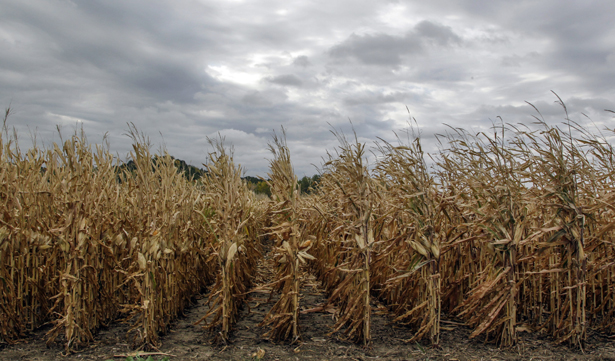
AP Images
Dear Mr. President,
You promised, days after you were re-elected, that you would lead a national conversation about climate change during your second term. Well, here’s your chance, sir. Yesterday your own administration’s scientists have announced that 2012 was the hottest year on record for the Lower 48 states. This disturbing news provides all the opening you need.
As much as the record itself, what raised scientists’ eyebrows was the margin by which it was set: average temperatures in 2012 were a full degree Fahrenheit hotter than in 1998, the previous high mark. “That we beat the record by one degree is quite a big deal,” Jake Crouch, a scientist with the National Climatic Data Center, told The New York Times. In basketball, it would be akin to one team blowing out another team by twenty points. Equally alarming, this record heat helped to trigger enough extreme weather—the hottest July on record, the worst drought in fifty years, the deadly storm surges of Hurricane Sandy and much more—to make 2012 the second worst year ever on the government’s Climate Extremes Index.
If ever there was a time for a president to lead a national conversation on climate change—to connect the dots between these destructive weather events and the government, corporate and consumer practices that need to change if our children are to inherit a livable planet, that time is… well, it’s come and gone numerous times already. You had a golden opportunity to make the case last year, when this nasty weather was actually taking place, tormenting Americans from Boston to Biloxi, Dallas to Des Moines. Unfortunately, you remained all but silent about climate change throughout the 2012 campaign. That grievous error, however, is all the more reason for you to honor your pledge and put the full force of your presidency behind this mission, starting now.
Do you remember what you said about why we needed a national conversation on climate change? You were answering a question during your first press conference after winning re-election. A reporter reminded you that Michael Bloomberg, the mayor of New York City, had endorsed you for president shortly after Hurricane Sandy devastated his city because he believed that you would do more about climate change than your opponent, Republican Mitt Romney. You told the reporter, “I think we’ve got an obligation to future generations to do something about it.”
Soon after, when Time asked you about how your daughters have affected your thinking as president, you singled out climate change. Urging “this country, and the world, to ask some serious questions about what are we leaving behind,” you said you didn’t want your kids “dealing with stuff that is the result of you [as a parent] making bad choices.”
Popular
"swipe left below to view more authors"Swipe →
Surely, sir, this is a sentiment that large majorities of the American people will share—if you use your bully pulpit to start the conversation you promised. All Americans, regardless of political ideology, love their kids and want their futures to be safe and bright. And all Americans endured the ghastly weather of the last twelve months. Indeed, many are still suffering its consequences, and not only those who were ravaged by Hurricane Sandy.
Much of the farm belt, too, is still hurting from the relentless drought that parched soil and stunted crops last summer. Worse, that drought is still underway in many farming communities, raising the possibility that crops will falter again in 2013. As president, you hardly need to be advised that this is no small danger. It’s easy for city and suburban folk to overlook, but America’s standard of living and global influence are directly dependent upon its status as an agricultural superpower that can produce an immense amount and variety of food at affordable prices.
This is one of the dots that needs connecting in the national climate conversation: helping both rural and urban Americans understand that climate change poses a grave threat to the very basis of human existence—our ability to feed ourselves. Today, that threat is manifested primarily (in a rich country like ours) in lower crop yields and the higher food prices they engender. But if the threat is left unaddressed, our children, to say nothing of children in food-stressed countries overseas, will face much harsher conditions. And this outcome, which is still avoidable if we act quickly and decisively, will be our own fault. In effect it will be the result, to paraphrase your remarks to Time, of us making bad choices as parents.
Acting quickly and decisively is easier said than done, of course. Mr. President, no fair-minded person would say that the political circumstances facing you are uncomplicated ones. Nevertheless, the physics of climate change—the fact that the long lifetimes of carbon dioxide molecules have already locked in a dangerous amount of future global warming, even if we start slashing emissions now—demand that you do more than lead a national conversation. At this late date, the leader of the most powerful nation on earth cannot merely talk; he must also act, and act boldly. It is a tragedy that the House of Representatives is controlled by a Republican Party that refuses to acknowledge basic science or to challenge the fossil fuel industry in any way. But this does not excuse you from taking all lawful actions available to you as the head of the Executive Branch. You have it within your power, by authority of the Clean Air Act (an authority affirmed twice in recent years by a right-leaning Supreme Court) to regulate the carbon dioxide that is driving global warming. It is past time that you use this authority, and more.
In closing, sir, please remember: you too are a parent—the Parent-in-Chief, one might say. And with all due respect, your daughters—and all the world’s children—need you to start acting like it.


